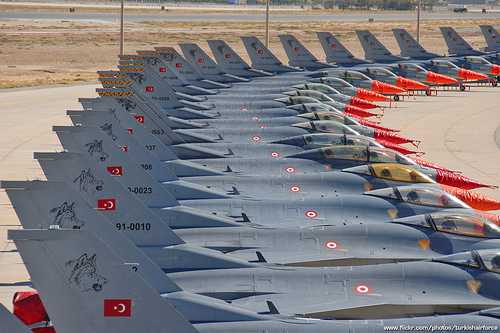Ali Yenidunya in EA Middle East and Turkey

Our question for today: is Turkey still a pro-Western country looking forward to entering the European Union. Or has Ankara, “unfortunately, joined the radical axis formed led by Iran and supported by Syria, Hamas and Hezbollah”.
Let’s start with a statement by Israeli Prime Minister Netanyahu on 11 October:
We also had wonderful, friendly relations with another country, with military cooperation, with full diplomatic relations, with visits by heads of state, with 400,000 Israeli visitors to that country. That country is called Turkey.
What prompts Netanyahu to use the past tense? Is it because Turkey ejected Israel from a planned international air force exercise or because Turkey and Syria held joint military exercises in late April? Is it because Turkey’s Prime Minister Recep Tayyip Erdogan told off Israeli Prseident Shimon Peres over Israel’s bloody war in Gaza in World Economic Forum in Davos in January 2009 or because Turkey did not stop the Freedom Flotilla which tried to break the Gaza siege?
Is it because Turkey conditionally accepted NATO’s planned anti-missile system, saying that it should not be presented as a defence against Iran? (On Friday, Turkey’s Foreign Minister Ahmet Davutoglu said: “We do not perceive any threat from any neighbour countries and we do not think ouur neighbors form a threat to NATO.”) Or is it because of a joint Turkish-Chinese air-force exercise held two weeks ago?
If I may offer an alternative to the “radical axis” thesis at this point….
Ankara’s new foreign policy under the Justice and Development Party is not a revisionist manoeuvre but a reflection of its rising autonomy due amidst Washington’s decreasing power — from Afghanistan to Pakistan to Iraq to the rest of the Middle East — coupled with regional powers taking more initiative, economically and politically. Ankara, like its regional neighbours, wants to get benefit from this international conjuncture.
And in order to become a stronger regional power, Ankara had to give up its discourse based on antagonism towards its neighbours (no need even to mention the need to solve its Armenian, Kurdish and ecumenical Greek Orthodox problems). The next step was to increase trade, boost bilateral relationships, build trust with old enemies, and raise your credibility with statements showing you are standing with the “weak”. Erdogan did this for Gazans and for Uighur Turks in northwest China. (How fast do we forget that Erdogan blamed a Chinese official of committing a “a near genocide” after the killing of 184 people last year in the conflict?)
Some other facts: Turkey signed eight new trade agreements with China in early October, bypassing the US dollar for direct business between the Turkish Lira and Yuan. The goal is to achieve a trade volume of $100 billion in ten years from the current amount of $17 billion. As for the “existential threat” of Iran, the trade volume between Iran and Turkey was $1.4 billion in 2000 but it was $8 billion in 2008. (And of this, only $236 million in 2000 were Turkish exports; by 2007, the figure was $1.3 billion.) Turkey is now carrying out around 14 to 15% of its trade with its neighbours as opposed to 3 to 4% in the previous decade.
As a champion of privatisation, Turkey is still a relatively “liberal” — perhaps neo-liberal — country, both economically and politically. This is still the same Ankara trying to be a part of European Union, following the adjustment of domestic law to the harmonization code of the EU in 2001 and in 2004. That is not to say Ankara is doing a great job fulfilling all of the democratic criteria to become a member state of the EU, but it has a pro-Western identity.
I call my closing witness. Who would like to see a stronger Turkey (with reduced tension with Israel, of course) that has close relationships and is diplomatically and economically capable of holding negotiations with Iran, Syria, Afghanistan, and Pakistan?
Talking to BBC’s “Record Europe”, US Foreign Secretary Hillary Clinton said: “Turkey is becoming a greater global and regional power. Its economy is growing dramatically. They are extending to countries and try to be effective on their own as well as with us.”
Increasingly autonomous? Yes. Radically evil? No.
Article originally appeared on EA WorldView (http://www.enduringamerica.com/).

Leave a Reply